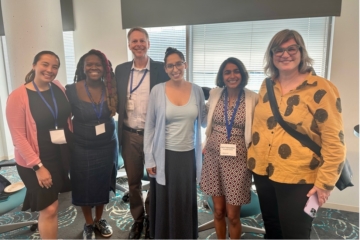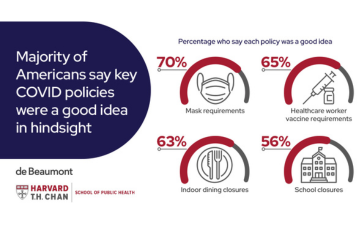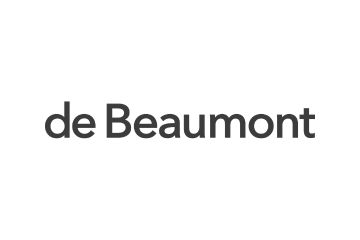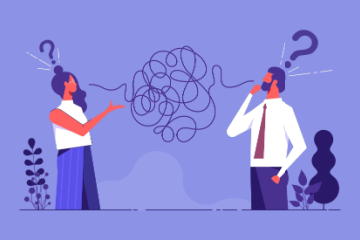“As time went on, the balance of things I wanted for my family started to tip the scale. The pros and cons of getting the vaccine shifted.”
That’s how Elizabeth of Pennsylvania described how she overcame her doubts about COVID-19 vaccines and decided to get vaccinated. She was one of 18 vaccinated people who participated in a focus group held by the de Beaumont Foundation and pollster Frank Luntz April 29. Like Elizabeth, all of the other participants had previously said they wouldn’t get vaccinated. Many said they changed their mind after learning more about the dangers of COVID-19 and seeing friends and family members get the vaccine without any complications.
Part of the de Beaumont Foundation’s ongoing research on Americans’ attitudes about COVID-19, the focus group was designed to reveal insights that may help build confidence in the vaccines among people who are currently reluctant to be vaccinated. Watch a 10:30 summary below.
The discussion reinforced findings that de Beaumont and others have found when examining perceptions of COVID-19 and vaccines. Following are some of the themes we heard, followed by a more detailed breakdown of the two-hour session.
- Their decision to get vaccinated came after their perceived risk of getting COVID-19 outweighed their concerns about the safety of the vaccines.
- They were motivated by things they want to be able to do, like travel, go to sporting events, and safely see friends and family.
- The most influential source of information about COVID-19 vaccines was a doctor, pharmacist, or other medical professional who they knew and trusted.
- They became more comfortable after seeing people they know get vaccinated without major complications. (This was much more important to them than seeing politicians, athletes, or other celebrities get the vaccine.)
- When asked about their thoughts about people who still say they won’t get vaccinated, many said they respect that position because everyone has the right to make their own decision, while others said those people are uninformed, misinformed, and “a little selfish.”
Why they decided to get vaccinated:
They learned more about the dangers of COVID, saw that people didn’t have any negative effects from getting the vaccine, and wanted to do things like travel and go to sports events.
- I had three family members and a neighbor pass away, and a friend that works in ICU in it on the COVID floor who told me how bad it was.
- I lost friends and family and saw that people were getting the vaccine and surviving it.
- I decided to get the vaccine after talking to some highly credible medical professionals that are family friends, and to first responders who see what’s going on.
- I wanted to get some sense of normalcy back like being able to go to a baseball game or being able to travel — you need to have the vaccination to do it.
- As time went on, I learned that there weren’t any major effects that people were having from these vaccines. The balance of things I wanted for my family — travelling and getting back to normalcy — those things sort of started to tip the scale. In my decisionmaking, the pros and cons shifted.
- I found out that I need it to travel and for work purposes. It was a choice of getting vaccinated or getting tested every day.
- I did the odds. I looked at the math, I got the numbers from the CDC. And I said, I’m not likely to get this disease. I’m a little more likely than some folks, but a lot less likely than people more elderly than me. And even if I do get it, I’m probably not going to get very sick from it. But looking at the vaccine, a lot of people have gotten it, it’s very effective, and very few people get side effects from it.
Who they most trust for information about the vaccines:
They relied on information from their doctor, pharmacist, and other medical professionals.
- My doctor, because he is the one who knows all of my health issues, who knows all the medications I take.
- My medical professional name knows me. He’s well researched. And he shoots straight with me.
- I asked my doctor, because he got the vaccine too. and all the medical professionals I know.
- My healthcare system, because that’s where all my medical history information is housed. So there’s checks and balances there.
- My pharmacist. I’ve had the same pharmacist for over 10 years. She has a lot of knowledge and information, so I can have a conversation with her about medications for me and my family.
- My doctor prescribes everything, but the pharmacist is the one who will take the time to let me know about the side effects.
- The CDC, because they’ve dealt with pandemics and epidemics and coronaviruses specifically, and they have a long history of doing that and finding solutions.
- I haven’t been to my doctor in almost a year. So I actually got a lot of my information and made my decision on when and where to get the vaccine from my friends and family on social media, because I’m on Facebook and Instagram almost every day. So I was influenced by my friends and family who got the vaccine.
What they think about people who say they won’t get vaccinated, and what they would tell them:
Responses were mixed: They have the right to decide for themselves. They’re “a little selfish.” They’re uninformed. They’ll come around.
- It’s perfectly within their right to not do it — that doesn’t have anything to do with me.
- It is their free will. And as long it’s America, they have a choice.
- They’re going to come around, because they’re going to want to do things they can’t do without the vaccine. Even some colleges are starting to mandate vaccines. I think more and more places are going to mandate that you need to have it.
- I understand. I respectfully disagree. And I think you’re a little selfish.Because for me, I shifted my focus from myself to other people and a bigger picture outside of just my bubble. And that was when I decided to get the vaccine.
- if you don’t get the vaccine, you’re risking your life and other people’s lives. And you can risk your life, that’s cool. But you’re risking other people’s lives who can’t get the vaccine for medical reasons.
- I would say I was a skeptic too. I value your freedom. Keep searching and stay informed.
- I would tell them to reevaluate the situation and make the best decision for you but this into the facts and watch what’s going on. Talk to someone who was skeptical and see what changed their mind.
- We just can’t lump everybody together and call them stupid or selfish. Everybody has a different reason. I was a skeptic, and I changed my mind for my own personal reasons. In time, just be open and do what you’re led to do. Trust your conscience — nobody can make you change what you don’t want to change.
How they’ve convinced others to get vaccinated:
- My mother is in her 80s. She’s a former nurse, and nurses make crappy patients. She didn’t want to deal with the side effects and all of that. But I said,”I love you. I don’t want to lose you. I think you’re in the vulnerable group.” So it but it was gentle coaxing and just being real with her.
- My husband just lost a very good friend to COVID. I asked him, “Do you want to get sick like this? What if the alternative is better than this?”I said, “Your parents got it. One of your closest friends got it and passed away. And he wasn’t that old. He was only in his 50s.” So he agreed, and he got it.
- I had a close friend, and we shared our skepticism together. I didn’t really need to say anything specific. I just shared my concerns about herd immunity and my family, and the younger generation of kids, and that persuaded her.
- I convinced my brother. I shared with him the story of my boss, who got sick for almost 90 days, as well as some others who have long-term disability from COVID. Like, the inflation part is hard, and that’s horrible.But you know, the long-term disability I think is really, really challenging. And if we could avoid that, we should and when he got the shot.
How they’ll know that America is back to “normal”:
Thing will be normal when there are no more masks, people can get together safely with family and friends, and businesses are fully open.
- Everything is open, full capacity. No more social distancing, businesses are open, just like we used to, and no more masks.
- No more social distancing
- When we’re not wearing a mask and we can celebrate, hug, and give high-fives.
- When Manhattan’s vibrant, and I guess that’s what you can call normal, but it’s never going to get back to normal because as many in the medical community have warned, there’s going to be another pandemic.
- When I can safely take my child on a vacation or even to the playground, without worrying what she’s touching and when was the last time she washed her hands.
- When I’m not terrified to stand in a room with six other people and breathe. I have no idea when that will be, but that’s it.
Get more insights and communication tips at ChangingTheCOVIDConversation.org.




